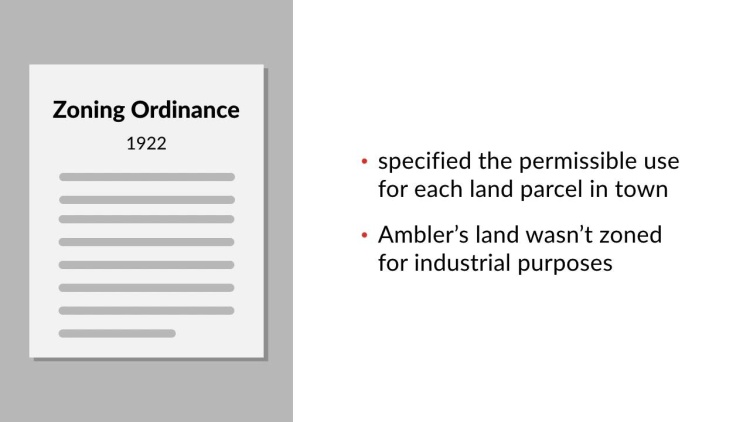Village of Euclid v. Ambler Realty Co.
United States Supreme Court
272 U.S. 365 (1926)

- Written by Sara Rhee, JD
Facts
Ambler Realty Co. (Ambler) (plaintiff) owned land in the Village of Euclid (Euclid) (defendant), a largely residential suburb of Cleveland, Ohio. In 1922, Euclid enacted comprehensive zoning ordinances and created a board of zoning appeals charged with enforcement. The regulations created different districts based on the class of use, including purely residential, mixed use, commercial, and industrial. As a result of the ordinance, Ambler’s land was partitioned in terms of the types of uses that were permissible on it. Most notably, portions of Ambler’s land were zoned in such a way as to prohibit the development of industry. Ambler brought suit against Euclid, alleging that the zoning ordinance violated the Fourteenth Amendment of the United States Constitution, as well as the Ohio Constitution, by depriving Ambler of liberty and property without due process. Specifically, Ambler argued that the ordinance significantly reduced the land’s value and deterred potential buyers. Euclid moved to dismiss on the ground that the zoning regulations had not yet been enforced against Ambler, because Ambler had not applied for any building permits. The motion was denied. The district court held that the ordinance was unconstitutional and enjoined its enforcement. Euclid appealed to the United States Supreme Court.
Rule of Law
Issue
Holding and Reasoning (Sutherland, J.)
What to do next…
Here's why 905,000 law students have relied on our case briefs:
- Written by law professors and practitioners, not other law students. 47,100 briefs, keyed to 995 casebooks. Top-notch customer support.
- The right amount of information, includes the facts, issues, rule of law, holding and reasoning, and any concurrences and dissents.
- Access in your classes, works on your mobile and tablet. Massive library of related video lessons and high quality multiple-choice questions.
- Easy to use, uniform format for every case brief. Written in plain English, not in legalese. Our briefs summarize and simplify; they don’t just repeat the court’s language.





